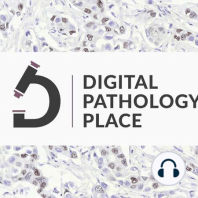2 min listen

AI-powered digital diagnostic tools for medical, veterinary and environmental laboratories. How Techcyte uses AI for digital cytology and smears w/ Be…
AI-powered digital diagnostic tools for medical, veterinary and environmental laboratories. How Techcyte uses AI for digital cytology and smears w/ Be…
ratings:
Length:
42 minutes
Released:
Nov 2, 2021
Format:
Podcast episode
Description
AI-powered algorithms for digital pathology and tissue image analysis are not new, also digital cytology and hematology already have their share of AI algorithms helping pathologists with faster and more accurate diagnoses. But what about parasitology or microbiology? Techcyte has a tool for that as well. Today my podcast guest is Ben Cahoon, the CEO of Techcyte, a software start-up that provides AI-powered diagnostic tools for everything smearable: fecal, blood, cytology, and microbiology smears. Imaging specimen smears has all the challenges of digital cytology such as correct focusing, and then some more. This is why Techcyte's pipeline starts with optimizing the sample preparation for imaging through close collaboration with sample prep vendors, who then work with scanner manufacturers to ensure optimal image quality. Only then can data for model development be annotated. Techcyte deep learning models specialize in the detection and classification of different structures such as blood cells, parasite eggs, and bacteria. The annotation process consists of placing bounding boxes around structures of interest to train the initial model followed by accepting or rejecting structures suggested by the preliminary model. This helps the model improve future predictions and in computer vision terminology is known as reinforcement learning. The images of the diagnostic samples are sent for analysis via a web browser and the results can be accessed there as well. Techcyte's mission is to digitize and automate diagnostics through AI in order to minimize the cost of healthcare and the number of diagnostic mistakes. In the process of following their mission, Techcyte perfected the technique of fecal float imaging, which allowed them to penetrate and serve the production and companion animal market. In turn, this served as proof of concept and provides a revenue stream that enables the funding of further developments. Their vision for medical diagnostics consists of five phases: phase 1 is to automate an existing test such as a peripheral blood smear or fecal smear evaluation, to increase efficiency and recall; phase 2 focuses on eliminating/ reducing the need for evaluation of the negative samples, which e.g., can constitute over 95% of fecal smears; phase 3 would function as a diagnostic support tool presenting a diagnosis to the expert for confirmation;phase 4 would enable the replacement of expensive tests such as flow cytometry with inexpensive image analysis tests · and in phase 5 results of expensive and slow tests, for which microscopy is not the gold standard, such as PCR and sequencing could be derived from the image properties. This would eliminate costs and tremendously decrease the diagnostic turn-around time. Reaching phase one will improve patient care significantly. Reaching phase five will revolutionize it. This episode’s resources:Detection of Intestinal Protozoa in Trichrome-Stained Stool Specimens by Use of a Deep Convolutional Neural Network Computer Vision and Artificial Intelligence Are Emerging Diagnostic Tools for the Clinical Microbiologist Evaluation of the VETSCAN IMAGYST: an in‑clinic canine and feline fecal parasite detection system integrated with a deep learning algorithm Further evaluation and validation of the VETSCAN IMAGYST: in-clinic feline and canine fecal parasite detection system integrated with a deep learning algorithm Techcyte AI-Powered Digital DiagnosGet your "Digital Pathology Beginners Guide" E-book for free! Sign up for the waiting list here.
Released:
Nov 2, 2021
Format:
Podcast episode
Titles in the series (89)
Welcome to the Digital Pathology Podcast! by Digital Pathology Podcast